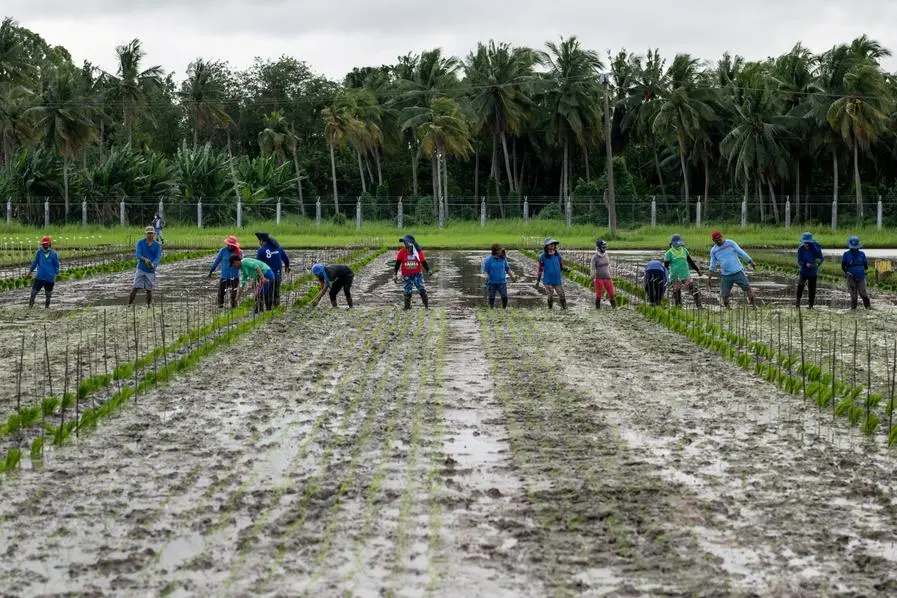PHOTO
The Commission on Elections (Comelec) granted yesterday the Department of Social Welfare and Development (DSWD)'s request to be exempted from the ban on payouts in relation to the forthcoming Oct. 30 barangay and Sangguniang Kabataan elections (BSKE).
With the exemption, the Comelec said the DSWD could release, disburse and expend, during the prohibition period from Sept. 15 to Oct. 30, financial aid amounting to P800 million to affected rice retailers.
Comelec Chairman George Garcia issued the exemption upon the request of the DSWD as well as the recommendation of its law department.
'Upon evaluation, we find the request to have sufficiently complied with the requirements,' the Commission said in granting the exemption.
But the Comelec reminded the DSWD to ensure that the distribution of financial aid shall not in any manner influence the conduct of the BSKE.
The Comelec also stressed that financial aid must only be given to qualified individuals.
'The approval of DSWD Secretary Rex Gatchalian's request recognizes the urgency of addressing the economic challenges faced by vulnerable micro-scale rice retailers across the nation,' Social Welfare Assistant Secretary Romel Lopez said.
This means DSWD officials can continue to conduct payouts of the Sustainable Livelihood Program cash assistance for micro rice retailers, in coordination with the Departments of Trade and Industry and the Interior and Local Government.
'We appreciate the Comelec for recognizing the importance of our economic relief efforts and granting us this exemption. With this decision, we can continue to provide critical support to our micro rice retailers during this challenging time,' he said.
The economic relief subsidy program, initiated by the DSWD, aims to provide essential support to micro rice retailers who have been adversely affected by the imposition of price cap on regular and well-milled rice.
As of Sept. 11, the DSWD has disbursed around P7.5 million worth of assistance to beneficiaries from San Juan City, Caloocan City, Quezon City, Parañaque City, Navotas City and Zamboanga del Sur.
Also exempted from the election ban were the DSWD's Assistance to Individuals in Crisis Situation program, Food Stamp Program, Tara, Basa! Tutoring Program, Oplan Pag-Abot, Project Lawa, Social Pension Program, Centenarian Program and Supplemental Feeding Program.
The DSWD is also given authority to continue the use of funds for the Pantawid Pamilyang Pilipino Program, Bangsamoro Umpungan sa Nutrisyon, Enhanced Partnership Against Hunger and Poverty, Kalahi-CIDSS, Payapa at Masaganang Pamayanan or PAMANA Program, Recovery and Reintegration Program for Trafficked Persons, Psychosocial care and support for persons living with HIV and their affected families.
Also included in the approved request are the Targeted Cash Transfer Program, MNLF Transformation Program, Beneficiary First Project, Residential and Non-residential Care Program, Philippine Multi-Sectoral Nutrition Project, Socio-Economic Program for Normalization of the Commissioned Combatant and Modified Shelter Assistance Project.
Going well
The implementation of the mandated price caps on rice is going well, according to President Marcos, who is also the country's agriculture chief.
'We just had a meeting about that this morning and so far, the implementation and enforcement is going as well as we can expect,' Marcos said on Tuesday.
The President acknowledged small retailers are concerned they would not receive any compensation if they sell the staple at lower price.
Based on the initial list provided by the Department of Trade and Industry, there are 5,942 affected rice retailers who have business permits in public and private markets and may be considered for the grant based on the DTI's vetting process.
Marcos reiterated that imposing the price ceiling on rice in the long-term is not a sustainable solution to the problem of increasing prices.
He noted that the price cap is only temporary, until sufficient supply from local producers and imports are available.
PCCI: Remove tariffs
Philippine Chamber of Commerce and Industry president George Barcelon expressed support for the removal of import duties for rice to help bring down the prices for consumers.
'But for how long? I don't know. They have to study it,' Barcelon said.
'We have, according to some projections, our harvest moving forward, the next few months would be good then that would mean more supply,' he added.
'But in the meantime, since we're short of rice, when we import we hope there won't be tax so you lower down the cost of rice,' Barcelon said.
Finance Sec. Benjamin Diokno recently proposed that the current 35 percent tariff rate for rice be slashed temporarily to zero, or just 10 percent at most, as early as October to arrest the continued surge in prices of the commodity
Copyright © 2022 PhilSTAR Daily, Inc Provided by SyndiGate Media Inc. (Syndigate.info).





















